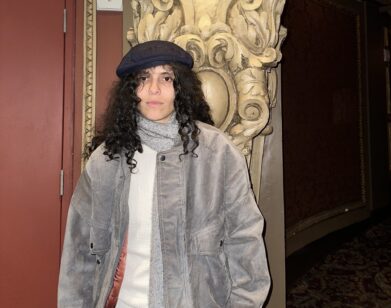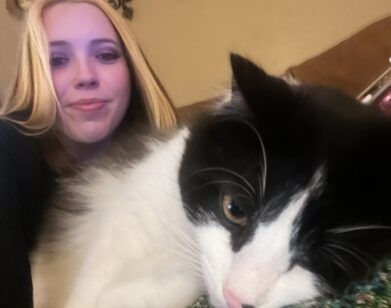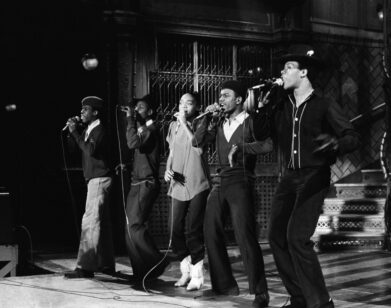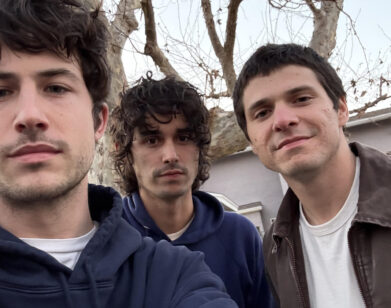Ben Gibbard’s Seventh-Album Stretch
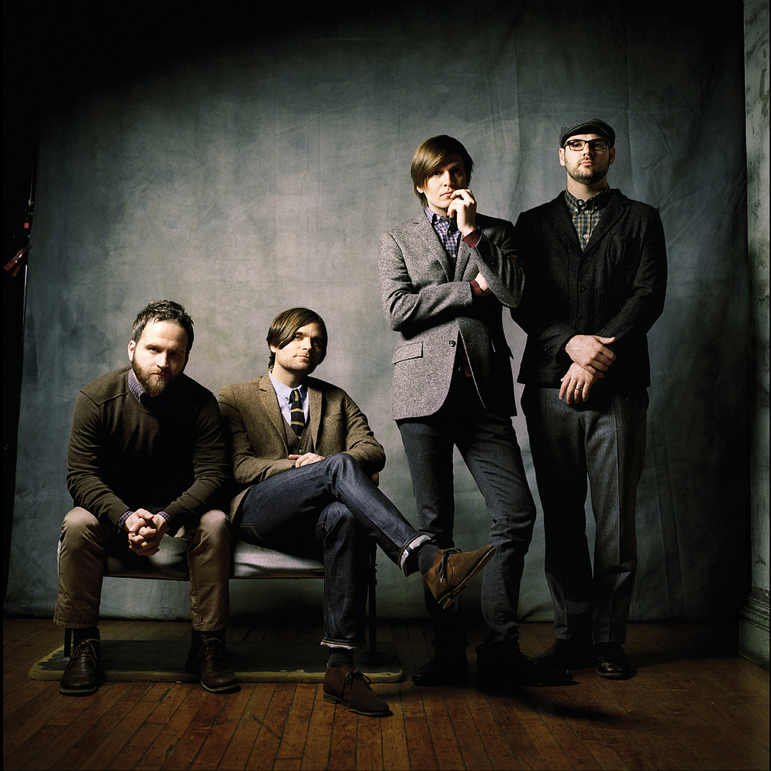
BEN GIBBARD (SECOND FROM LEFT) AND DEATH CAB FOR CUTIE. PHOTO COURTESY OF DANNY CLINCH
Just the other day, Ben Gibbard got into a bit of a Twitter spat. A music blogger, @outroversion, complained that the band’s new music is “wishy washy,” to which Gibbard replied: “@outroversion i’m sorry u don’t like us anymore. thankfully for us, others do. our old lps are always there for you if you prefer them.”
It is, Gibbard admits, hard for Death Cab to keep everyone happy as the band moves forward. At the end of this month, the group will release its most recent studio album, the seventh in its lengthy discography. Their newest venture, Codes and Keys, manages to still sound like a Death Cab for Cutie album, while also reinventing the formula that made the group beloved. Gibbard provides his characteristically smooth vocals as the band toys with a range of styles in songs that brim with percussion and hooks.
Gibbard talked with us recently about the new album, the band’s recent video project, and becoming “accidentally straight-edge.”
ESTHER ZUCKERMAN: You guys are now old pros at this. How do you try to innovate, while still keeping the general sound that have kept fans loyal to you for so many years?
BEN GIBBARD: It’s a delicate balance. Therein lies the challenge for any band that’s more than a couple albums deep. It’s like, how do you continue to make records that are representative of who you are that your fans will recognize as your band, while still trying to push things forward and present new sounds for people. Every record we do there are always two camps. There’s the camp that’s like, “I love it. It sounds different than the last one.” There are the people that are like, “I want it to sound like the last one.” You can’t please everybody all the time, but I think for the most part we tend to maintain a healthy level of self-reference to kind of make sure we continue to push things forward.
ZUCKERMAN: The first song on your new album, “Home Is A Fire,” sounds at the beginning like it has a jazz drumbeat, and then begins to bring in an electronic sound similar to The Postal Service. What sound were you going for on this new album?
GIBBARD: We never sit down before we start making a record and talk about this new sonic palette that we are going to try to explore. We always let the record kind of reveal itself to us over time. Between every record, we all split off in our own world and we all end up listening to usually pretty different music on our own. We come together not really knowing what the other people having been really listening to and what’s been influencing them. So we come into the studio and all I’ve been listening to is ’60s baroque psych pop and the Louvin Brothers. Then Chris [Walla] comes in having gotten really into these ’70s kind of analog synth world kind of stuff, and Jason [McGerr]’s been listening to what he’s been listening to, and Nick [Harmer]’s been listening to what he’s been listening to. Then we kind of interpret the batch of songs through whatever combination of palettes we’ve all been being influenced by at that time. With the last record, [Narrow Stairs], most of the songs I turned in were guitar rock songs so it seemed appropriate that we would just kind of go at it as the four of us playing in a room. Everyone had a part to play and there was less exploration as far as what the songs were going to be from the demo to the record. But with this record most of the stuff that came in, it wasn’t really tied to a guitar hook outside of something like “You Are A Tourist.” This batch of songs ended up being interpreted through the Venn diagram of all of our palettes as far as what we’d been listening to a lot recently, and the kind of colors we wanted to use with this band.
ZUCKERMAN: I was going to say that, having listened to Narrow Stairs a lot and the earlier stuff, it felt more exploratory and electronic in a way. Where did that come from, based on what you guys have been listening to?
GIBBARD: If the record sounds electronic, it has more to do with the fact that I think there’s a pretty healthy dose of analog keyboards and synth on it. “Home Is A Fire” is by far and away probably the most out there sonically. It’s definitely a curveball at the top of the record, which is what we wanted to have happen. I think it’s more just from the fact that Chris brought us a huge collection of analog keyboards and the fact that a lot of the songs weren’t tied to guitars, and also the fact that we did this record as more of a construction project than a four people in the studio playing live like we did with Narrow Stairs.
ZUCKERMAN: What do you mean by “a construction project?”
GIBBARD: I would do a guide track. Play piano and sing or play guitar and sing to a metronome, and then we would kind of arrange the song around the barest bones and structure. We knew where the choruses were and where the verses were and everything had a little bit of room to move. We kind of built a foundation and then started putting the whole thing together around that foundation, versus, “This is the baseline and here is the guitar part and the drums go like this, now let’s all play it together and we’ll add sprinklings and percussion on top of it and call it good.”
ZUCKERMAN: The music video for “You Are A Tourist” has been billed as the “First Live, Scripted, One-Take Music Video Shoot. Ever.” How did that idea come about and why did you decide to do it?
GIBBARD: The idea came from a really good friend of ours and longtime collaborator, a guy named Aaron Stewart-Ahn. People have done live performances as a video, you know, you do it once or twice on a soundstage and clean it up and call it a video, but nobody’s ever done that with any kind of real camera movement and choreography before. We had this great director, Tim Nackashi. Everything went according to plan. Tim, the director, really nailed the right balance of tightrope walking and safety.
ZUCKERMAN: Switching topics, in March you ran the Los Angeles Marathon. How did you get the idea to do that and how long had you been training for that?
GIBBARD: I’ve been a runner for about three and a half years. I typically run between 20 and 30 miles a week, depending on my schedule and when I can get it in. I kind of dropped a lot of bad habits about three years ago and became kind of accidentally straight-edge. I don’t have Xs on my hands, but I guess if I wanted to go back to calling myself straight-edge, I could. Around that same time I started running. I never saw myself as the kind of person who would become a runner. It seemed unfathomable to me that I would ever run three miles, let alone 26.2.
I spent basically since Christmas until March 20 training for it. It was difficult, just as a feat. It was pouring that day. By the time I got to mile 13, my shoes and socks and all my clothes—well, my shoes and socks specifically—were soaked to the bone. If I had jumped in a swimming pool and ran the other half of the marathon that was pretty much what it was like. I didn’t get any help on that front, but I finished under four hours, which is kind of what I was really hoping for. It was the most difficult thing I’ve ever done in my life.
ZUCKERMAN: How much money did you raise for 826 in the process?
GIBBARD: About a day before the race, I put out a tweet that said listen, anybody in the next 24 hours that donates to 826 for the race, I’ll match the funds for Japan. In the last 24 hours, we ended up raising another five grand. By the end, it ended up being about 7,500 bucks. A large portion of that went also to Japan, because people were able to donate both. That, in a way, kept me going through a lot of it. I kept joking if [my wife] Zooey [Deschanel] would have pulled up in a car around mile 20 and said, “Hey, do you want to go home?” I would have gone home.
ZUCKERMAN: “Codes and Keys” is the second song on the album. Why did you decide you wanted to name the album Codes and Keys?
GIBBARD: We just sort of liked the coupling of those words and I think that they certainly reflect themes of home throughout the record. They can be the physical keys to open doors. It can be taken in the metaphorical sense, in the way you can unlock a person and learn who they are and how people learn who you are. The word “codes,” at least to me, represents, it’s the kind of numbers you have to punch in to get into an apartment building or turn on or turn off a physical security system in your house or in your studio or whatever else. But they also represent they language people use amongst each other when they really know each other. Everybody has a language or code that they use with their wife or their girlfriend or boyfriend or what have you. It’s a language aside from the language they have with strangers. I’ve always been maybe an abuser of alliteration, but I’ve always loved it and I like how those words sound together.
CODES AND KEYS IS OUT MAY 31. THE BAND IS TOURING THROUGHOUT THE SUMMER, INCLUDING A DATE AT THE BOWERY BALLROOM ON JUNE 1. FOR MORE INFORMATION, VISIT THEIR WEBSITE.


